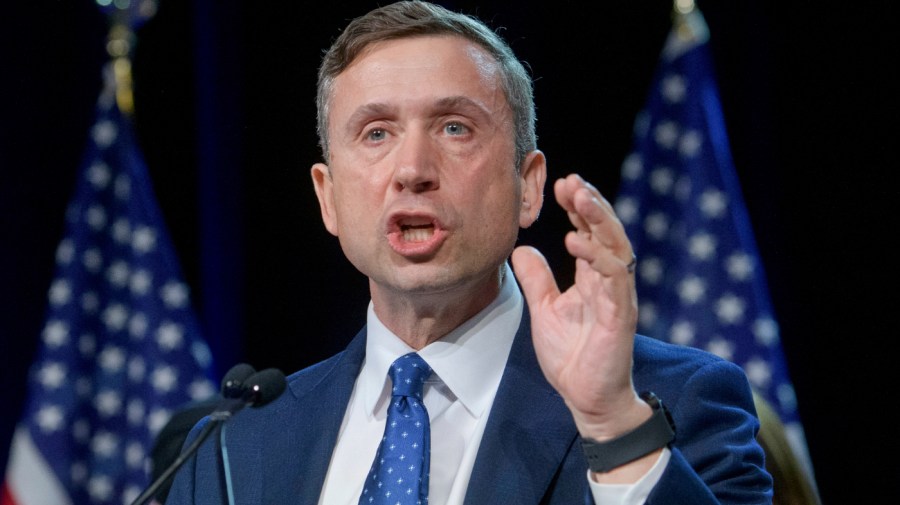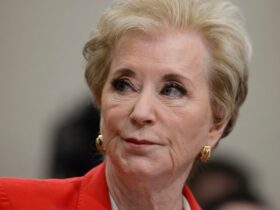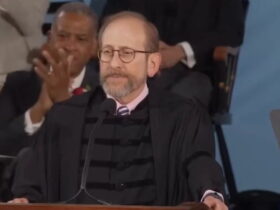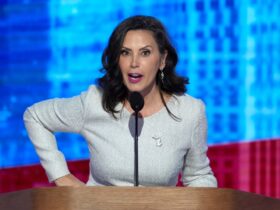The deepest threat to becoming an authentic voice in national politics lies in choosing between your identity, even your self-worth, and what you’re expected to represent.
The question becomes: Do you leverage your lived experiences to lead from a place of expertise and, hopefully, empathy, or do you channel those qualities into amplifying a platform bigger than yourself?
If Democrats intend to wrestle power from the sticky fingers of an authoritarian White House and return it to the people, they’ve got to lose their collective main character energy and focus instead on offering actionable solutions to the groundswell of voter dissatisfaction the Trump administration’s policies are creating.
What is main character energy, you ask?
The strongest example in American politics ever may be President Donald Trump’s unapologetic dismantling of U.S. agencies, policies and institutions intended to protect Americans from government overreach. He descended a decade ago from the second floor of his 58-story tower, waved to the cameras and knew immediately: I own them.
Trump believes the media, voters and government institutions are controlled by the strings he pulls, and why shouldn’t he? Barely four months into his presidency, he’s traded campaign promises of lower grocery prices and reshored manufacturing jobs for crypto schemes and business deals that aren’t rippling out or trickling down to anybody outside his billionaire donor circle.
And his base couldn’t love him more, even after he said Americans should embrace short-term sacrifice for long-term security, less than one week before accepting a nearly half-billion-dollar plane “gifted” by a foreign government.
Democrats will never match Trump’s swagger, but they can certainly flip the script and lead through measurable, people-focused action that works no matter who’s at the top of the ticket.
Former President Barack Obama certainly exhibited main character energy, soaring to the presidency on little more than the promise of hope and change, barely two years after winning a U.S. Senate seat and never notching a single major legislative achievement.
The people catapulted both these men to the White House, but it’s the elites — the ultra-wealthy donors, elected officials and constitutionalists and their sprawling political networks — that set things in motion.
They put their thumb on the scale, giving someone who believes they’re “the one” to rescue humanity from itself the chance to rise, preferably while reinforcing the advocacy and business interests of their early supporters.
The media sees a hook, an angle, and says, “This is a personality we can cover.” They look for certain ingredients, often the drama drowning the airwaves.
Look at New York Mayor Eric Adams and former New York Gov. Andrew Cuomo: each accused of lying and stealing, one accused of being a sexual predator. Regardless of whether the public sees them as heroes or villains, the media and elites view them as central characters, so the story grows legs as they reclaim prominence in the New York City mayor’s race.
Voters like a personality, but more often, they want a hero or an anti-hero who promises to clean up the mess left by domestic and foreign enemies.
Maybe it’s Democrats who waste money when they’re in charge of government, or the far-right ideologues running the Republican Party. Maybe it’s the Chinese who control our consumer spending. Regardless, voters want their president to put on a suit of armor and avenge what’s been lost.
These central figures often see the rest of us as stand-ins, supporting actors in their story.
Not all high-profile leaders abuse their staff, but working on several presidential campaigns, I’ve seen staffers — myself included — believe they were the only ones who could protect a candidate from those who didn’t understand their greatness, and that dynamic can turn teams into acolytes.
After then-Sen. Obama was elected president, his young team launched a new organization to support his agenda, sidelining Democratic National Committee members and state party chairs. The party’s internal feud between the old and new guards torpedoed any chance of gains in red-to-blue states Obama had flipped.
Likewise, Sen. Bernie Sanders’ (I-Vt.) inner circle in 2016 believed they had to shield the senator from anyone who didn’t understand “the movement,” so they closed out the press and dissenting staff.
DNC Chair Ken Martin is working to reunite the fractured party to defeat Trump, and that means a lot of fresh ideas are surfacing. DNC Vice Chair David Hogg recently pitched one to the media: Democrats should challenge ineffective incumbents in primaries, an approach party leadership rejected soundly nearly a decade ago.
Hogg, like many others, is at a crossroads: Does he want to lead or be a team player?
It’s not easy to watch someone wrestle with that decision in public, but it’s a decision every Democrat must make: Do you want to be the boss, or do you want to carry the vision of someone with whom you align and make what they stand for stronger by being in the room?
I’ve chosen to believe in others, to use my skill set to support the vision someone else carries, but Democrats are losing daylight.
Trump is dictating the terms for America, and the only way to push back is for a two-party system to function properly, meaning rank-and-file Democrats need to choose once and for all between being a main character or working as a team.
Michael Ceraso is a Democratic strategist who served on four presidential campaigns, including those of President Barack Obama, Sen. Bernie Sanders (I-Vt.) and Pete Buttigieg. He is the founder of the communications firm Winning Margins, as well as Community Groundwork, a nonprofit supporting two-year students interested in civic careers.
















Leave a Reply